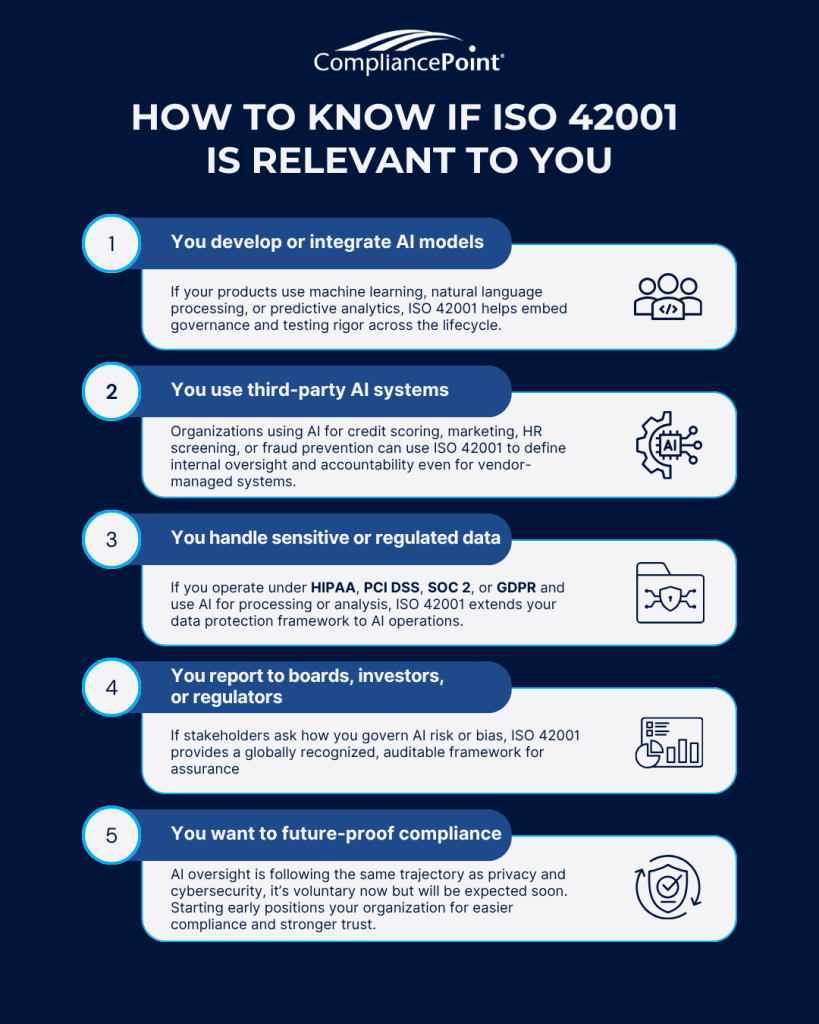Is ISO 42001 Relevant to Your Organization?
Understanding the New Standard for Responsible AI
Artificial intelligence (AI) is transforming how organizations operate, from automating customer support and analyzing risk to powering healthcare diagnostics and cybersecurity defenses. But as adoption accelerates, so do the risks: bias, data leakage, unexplainable outcomes, and unclear accountability.
Enter ISO 42001:2023, the world’s first international standard for AI Management Systems (AIMS). It provides a structured way to design, deploy, and govern AI responsibly and transparently.
Much like ISO 27001 became the benchmark for information security, ISO 42001 is poised to become the global framework for trustworthy, ethical AI.
Before you start preparing for certification, the key question is: Is ISO 42001 relevant to you and your organization?
What Is ISO 42001?
ISO/IEC 42001:2023 defines the framework for establishing, implementing, maintaining, and continuously improving an AI Management System (AIMS). It helps organizations ensure their AI systems are ethically aligned, technically robust, secure, compliant, and continuously improving. It applies to any organization that develops, deploys, or depends on AI, whether the system is proprietary or third-party.
Why ISO 42001 Matters Now
Global regulators and enterprise clients are converging around AI governance expectations. The EU AI Act, NIST AI Risk Management Framework, and emerging state-level AI laws all reflect ISO 42001’s principles of accountability, fairness, and transparency. Early adopters will build trust and credibility, reduce regulatory uncertainty, and demonstrate responsible innovation. At CompliancePoint, we’re already seeing clients in healthcare, fintech, SaaS, and data analytics incorporate AI governance evidence into RFPs, vendor assessments, and board reporting.
Why Now?
Released in December 2023, ISO 42001 is the first comprehensive international standard for responsible AI management. In 2025, adoption is accelerating as governments finalize AI regulations and organizations recognize the operational and reputational risks of unmanaged AI. Early alignment provides a measurable advantage before AI compliance becomes mandatory.
How to Know If ISO 42001 Is Relevant to You

You don’t need to be building AI models to fall within scope. If your organization uses or depends on AI to make or inform decisions, ISO 42001 is likely relevant.
You develop or integrate AI models: If your products use machine learning, natural language processing, or predictive analytics, ISO 42001 helps embed governance and testing rigor across the lifecycle.
You use third-party AI systems: Organizations using AI for credit scoring, marketing, HR screening, or fraud prevention can use ISO 42001 to define internal oversight and accountability even for vendor-managed systems.
You handle sensitive or regulated data: If you operate under HIPAA, PCI DSS, SOC 2, or GDPR and use AI for processing or analysis, ISO 42001 extends your data protection framework to AI operations.
You report to boards, investors, or regulators: If stakeholders ask how you govern AI risk or bias, ISO 42001 provides a globally recognized, auditable framework for assurance.
You want to future-proof compliance: AI oversight is following the same trajectory as privacy and cybersecurity, it’s voluntary now but will be expected soon. Starting early positions your organization for easier compliance and stronger trust.
Quick Self-Check:
- Do we have an inventory of AI systems and owners?
- Can we explain or audit AI decisions?
- Are AI risks integrated into enterprise risk management?
- Do we monitor model performance and fairness?
- Do we have clear AI accountability policies?
If you hesitated on any of these, ISO 42001 readiness should be on your roadmap.
How ISO 42001 Connects to Your Existing Frameworks
ISO 42001 was designed with Annex SL, the same structure used for ISO 27001 and other management system standards. That means if you already maintain an ISO 27001-certified ISMS, you’re roughly 60-70 percent aligned. The new framework simply extends your governance model to include AI-specific risk, accountability, and ethical controls.
For organizations with SOC 2 or HITRUST programs, ISO 42001 complements your control environment by introducing AI lifecycle and transparency requirements, creating a comprehensive, integrated governance system rather than a standalone checklist.
For a deeper dive, explore our related article: Leveraging Your ISO 27001 to Jumpstart ISO 42001 which explains how ISO 27001-certified organizations can efficiently map existing controls to accelerate their ISO 42001 journey.
What “Readiness” Looks Like
Being ISO 42001-ready isn’t about instant certification; it’s about having the foundation to achieve it. That includes defining accountability for AI operations and governance, establishing model development, validation, and monitoring procedures, performing AI risk assessments covering ethical, data, and performance dimensions, integrating AI oversight with your information security and privacy programs, and creating documentation and evidence for transparency and auditability.
In short, readiness means aligning your existing controls and culture to meet this new global expectation.
Common Misconceptions About ISO 42001
“It’s only for AI developers:” False. ISO 42001 applies to any organization using AI in decision-making or operations.
“It’s just an extension of ISO 27001:” Not exactly. It builds on the same structure but adds unique AI lifecycle, ethics, and accountability requirements.
“It’s too early to worry about:” The first certifications are already completed, and enterprise clients are beginning to request AI governance assurance in due diligence.
How CompliancePoint Helps
Our Assurance team, led by Brandon Breslin (ISO 27001 & ISO 42001 Lead Auditor), helps organizations assess and operationalize AI governance through:
- AI Governance Readiness Assessments aligned with ISO 42001.
- Control Mapping across ISO 27001, SOC 2, and HITRUST frameworks.
- Governance Framework Design AIMS policies, documentation, and roles.
Using Fieldguide automation, we streamline evidence collection and assessment processes, and project tracking, reducing time-to-readiness while maintaining quality.
Why CompliancePoint?
With deep experience across ISO 27001, SOC 2, HITRUST, and PCI DSS, CompliancePoint helps organizations evolve traditional compliance programs into next-generation governance systems. Our certified ISO 42001 practitioners bring both assessor-level expertise and operational practicality, helping clients move from concept to certification with confidence.
Where to Start
- Inventory your AI systems and define owners.
- Perform a readiness/gap assessment against ISO 42001 controls.
- Map existing frameworks to identify overlap.
- Assign accountability for AI oversight.
- Work with a consulting firm to build your readiness roadmap from assessment to certification.
Final Thoughts
As AI adoption accelerates, trust becomes the ultimate differentiator. ISO 42001 isn’t another compliance checkbox; it’s a proactive investment in responsible, explainable, and ethical AI.
At CompliancePoint, we help organizations turn AI governance from a risk into a reputation advantage.
Ready to find out if ISO 42001 is relevant to you? Reach out to us at connect@compliancepoint.com and let’s discuss your AI environment and build a readiness path that fits your goals!
Learn more by watching our “Is ISO 42001 Right for Your Business?” podcast below.
Finding a credible expert with the appropriate background, expertise, and credentials can be difficult. CompliancePoint is here to help.





